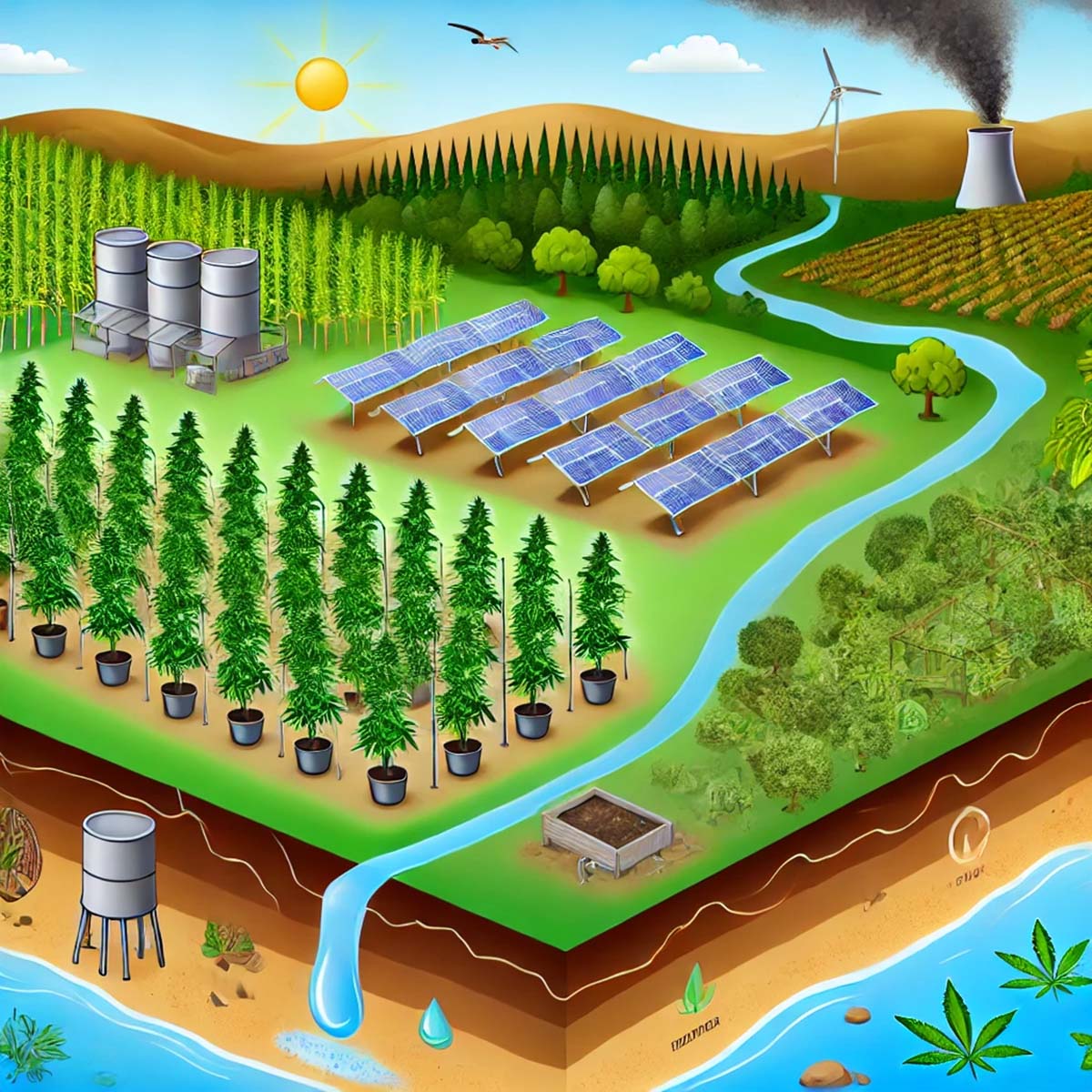As the cannabis industry continues to grow, it’s essential to consider its environmental impact. From water usage and energy consumption to sustainability practices, cannabis cultivation can have significant effects on the environment. Let’s explore the environmental impact of cannabis cultivation, highlighting both the challenges and the efforts being made to mitigate these effects.
Water Usage
High Water Demand:
- Description: Cannabis plants require a substantial amount of water to thrive, especially during the flowering stage. This can be particularly challenging in regions already facing water scarcity.
- Statistics: According to a study published in the journal Environmental Research Communications, cannabis cultivation can use up to 22.7 liters of water per plant per day during the peak growing season.
Sustainable Practices:
- Techniques: Growers are adopting sustainable water management practices, such as drip irrigation, rainwater harvesting, and using greywater systems to reduce water consumption.
- Case Study: Some cannabis farms in California have implemented these techniques, significantly reducing their water usage.
Energy Consumption
Indoor Cultivation:
- Description: Indoor cannabis cultivation requires extensive energy for lighting, climate control, and ventilation, leading to high electricity consumption.
- Statistics: A report from New Frontier Data indicates that indoor cannabis cultivation in the United States consumes as much energy as 1.7 million American homes.
Energy-Efficient Solutions:
- Techniques: Growers are switching to energy-efficient LED lighting, using renewable energy sources like solar and wind power, and improving insulation to reduce energy consumption.
- Case Study: A cannabis farm in Colorado successfully reduced its energy usage by 40% by installing LED lights and solar panels.
Carbon Footprint
Greenhouse Gas Emissions:
- Description: The energy-intensive nature of indoor cultivation contributes to greenhouse gas emissions, impacting the environment.
- Statistics: The same New Frontier Data report estimates that the cannabis industry is responsible for 1.3% of the United States’ total electricity consumption, contributing significantly to carbon emissions.
Carbon Offset Initiatives:
- Techniques: Some growers are participating in carbon offset programs, planting trees, and investing in renewable energy projects to mitigate their carbon footprint.
- Case Study: A cannabis company in Oregon has partnered with a local reforestation project to offset its carbon emissions.
Pesticides and Soil Health
Chemical Usage:
- Description: The use of chemical pesticides and fertilizers in cannabis cultivation can lead to soil degradation and water pollution.
- Impact: These chemicals can harm local ecosystems, affecting wildlife and contaminating water sources.
Organic Farming Practices:
- Techniques: Organic farming practices, such as using natural pest control methods, composting, and crop rotation, help maintain soil health and reduce environmental impact.
- Case Study: An organic cannabis farm in Washington State has achieved certification for its sustainable farming practices, using only natural pest control methods and organic fertilizers.
Waste Management
Plant Waste:
- Description: Cannabis cultivation generates significant plant waste, including stems, leaves, and unusable flower parts.
- Impact: Improper disposal of plant waste can contribute to environmental pollution and waste management challenges.
Sustainable Disposal:
- Techniques: Composting plant waste, recycling growing mediums, and using biodegradable materials for packaging are effective waste management strategies.
- Case Study: A cannabis company in Canada has implemented a comprehensive waste management program, composting plant waste and using biodegradable packaging materials.
Takeaways
Cannabis cultivation has a substantial environmental impact, from water usage and energy consumption to pesticide use and waste management. However, many growers are adopting sustainable practices to mitigate these effects. By implementing water-efficient techniques, using renewable energy, practicing organic farming, and managing waste responsibly, the cannabis industry can reduce its environmental footprint. As consumers, choosing products from environmentally responsible growers can also help promote sustainability in the industry.



